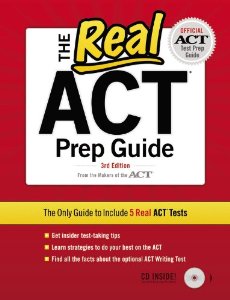
I recently ran a post that Brian Eufinger, who is co-owner of Edison Prep in the Atlanta, wrote that suggests that the ACT has recently gotten harder. If you missed that post, here it is:
Is the ACT Getting Harder?
Today I’m sharing an email that I received from Jed Applerouth, the owner of Applerouth Tutoring Services, about the evolving nature of  the ACT. Applerouth agrees that the test has gotten harder, but he believes the change happened earlier.
the ACT. Applerouth agrees that the test has gotten harder, but he believes the change happened earlier.
Here is Applerouth’s take on the ACT, which has never received as much publicity as the SAT, but is now the more popular test.
Thoughts from Jed Applerouth…
In terms of when the ACT began to toughen up, 2009-2010 is when we began to notice the changes. Subtle at first, and then more pronounced. The most dramatic changes took place in the science section.
Suddenly the test writers began to create much more time intensive, multi-phase questions. If you look at the tests of 2003-2008, you primarily find quick, one-hitter question types. We call them “get to the point” questions. Here’s the graph, table or chart, and they direct you to a specific data point. It’s a quick exercise, use the axes – or the categories, find the data, circle the answer, move on.
In 2009-2011 we saw more and more of these multi-phase questions. You find information in one table, apply it to a chart, and then use that  value in a graph to find the answer. Many more steps, greater demands for processing speed. At this point, I began to struggle, like Brian, to finish the ACT.
value in a graph to find the answer. Many more steps, greater demands for processing speed. At this point, I began to struggle, like Brian, to finish the ACT.
I took the ACT ten times in a few year span, and I was madly bubbling in answers when they called “time” on half of the administrations. And I’m pretty quick. I’m a 2400 SAT guy. But the pacing is just so tricky now, you really are in sprint mode the whole way through. Particularly on Science and Reading.
Students rarely, if ever, have timing challenges on the Writing section. Forty-five minutes, five vignettes…primarily quick grammar/mechanics questions – students can manage this. Math is 60 minutes, 60 questions, which most students manage. They’ll often max out on contact knowledge, i.e. knowledge of Trig identities or logarithms, but less frequently on time.
A Different Science Test
Reading is a challenge for many students. And Science is a sprint for every student.
The old science section was fairly easy, relative to the present section. And of the four sections, science has increased the most in difficulty by leaps and bounds. We see a few new question types in English, a few tweaks in Math and Reading, but science is a different test.
For that reason we always apply a discount factor on the science section. A 36 on an old science section may translate to a 31 on the current science. We coach our tutors to discount those tests from the Red Book for that reason. We always operated under the hypothesis that Science was getting harder because of the increased adoption of the ACT on the coasts with their cultures of test prep and higher scoring students.
The changing science section actually drove us to write a new ACT book with a science section that accurately reflects the difficulty of the current test. The book received great reviews. A better book was the only way we felt we could fully prepare our students for the rigors of the new science and all the multi-phase questions.
Why the ACT is Tougher
We were operating under the assumption that the influx of internationals with better math and science training, and East and West Coast students with more prep and higher scores were killing the score distributions. Things were getting too lopsided with too many perfect scores and a very steep curve. Miss a question or two, and you plummet to a 32 or 33.
In order to smooth out that curve, they had to increase the difficulty of the test and create harder questions. The level of difficulty ramped up, and I believe this helped normalize the score distributions. We are still seeing more perfect scores, but that is a reflection of a society more focused on testing and its impact on admissions and scholarships. Whatever you reward, people will focus on.
So these changes are not really new. The ACT is not suddenly harder. But if you took the test in 2005 and now, you’d notice a tremendous difference in the test’s difficulty. And this was never publicized.
The ACT operates under the radar, in most cases. That’s their modus operandi. Let the College Board take all the arrows and absorb all the criticism. By playing low, they’ve avoided scrutiny and critique. This has been an effective strategy, and the numbers speak to this.
Receive Lynn’s O’Shaughnessy’s Free College Guide
Here’s your chance to subscribe to my newsletter and instantly receive my new guide, Finding the Most Generous Colleges. The content of the newsletters is nearly identical so please only subscribe to one email list.
If you’re a parent or student, click here to subscribe to my newsletter and receive my new guide.
If you’re a college consultant or counselor, click here to subscribe to my newsletter and receive the guide.
If you’re a financial professional, click here to subscribe to my newsletter and receive the guide.



I’m really glad that you covered this issue. My daughter is getting ready to take her test for the first time in October. She tried both the ACT and the SAT practice tests. She scored fairly high in both tests. What we didn’t expect was her relatively low score on the science section (29). She is more interested in science than any other subjects, so her results really surprised us. She told us that the science section format and questions really doesn’t match up with her science classes. She also had to rush to finish the science section. Additionally the curve on the science section is much tougher. Due to this she is going to take the SAT.